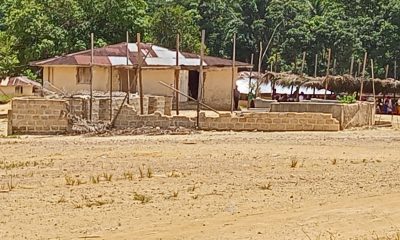Gbarpolu County – Gbarpolu County Education Officer (CEO), Mr. Dawolo B. S. Katawo said the Ministry of Education (MOE) has layoff 65 teachers from its payroll while also disclosing that the contracts of 28 teachers on a Plan Liberia International project for schools in the county will shortly end.
The news of massive layoffs of teachers in the county comes after a recent poor performance of senior high students in the 2016’s West Africa Examination Council (WAEC) exams, when only one senior high student made a passed in the whole county.
And Mr. Katawo said the redundancy of these teachers is happening as the county craves for more teachers.
“When I got the document, I perused it and found out that out of the 65 teachers’ layoff, 43 needed to be reinstated and 12 were actually floating teachers,” Katawo told a LocalVoicesLiberia reporter in Bopolu City.
Katawo said he made immediate recommendations, suggesting that 43 of the 65 teachers remain in their respective classrooms stressing that if his request is not consider, some of the district’s schools will be closed and people in the rural areas will have limited means of education.
The CEO also disclosed that Plan Liberia International contract with seven schools in both Gbarma and Bopolu Districts will officially expired at the end of September.
He named the Plan International sponsor schools as K.K Gonah Elementary and Jr. High, located in Yangayah Town; Weamawo public school in Vaye Town and Gbarma public school and Hilton & Duodee public school all in Gbarma District.
For Bopolu district, he mentioned Gayinmah public school, Jallah Lone Town Public School and Lowoma public school.
“Plan International was paying four teachers each from their sponsor schools in the county, accordingly, these 28 teachers will have to be absorbed by the MOE through the county school system to close the gaps in their schools,” Katawa said. He also recommended that these 28 teachers are absorbed into the public school and included on the payroll of government.
“For me if government does not put me on payroll, when Plan leaves I will also be leaving”, Zoe Q. Binda, a female teacher of Hilton & Duodee public school said.
According to Zoe, her decision to quit the classroom in the absence of the NGO comes from a bad experience she faced in the community from parents, while accusing PTA members of not being willing to help volunteer teachers.
For Nathan K. Zinnah, a teacher of Gaynimah Public school, the situation is a ‘threat to Gbarpolu County’s education’.
“Only government can give us long term job not NGO like Plan,” Zinnah said, while calling on the MOE central office through the CEO to work hard in restoring their hope which will help keep them in the classrooms.
Currently, there are 135 schools throughout Gbarpolu of which three are senior high schools with over 600 teachers.
The decision to lay off teachers in the county appears to be a part of recent decision by the Liberian cabinet after mandating what it termed as ‘a realistic implementation of actionable targets’ to improve the quality of learning in the country.
The Cabinet, this month announced that the reforms in the education systems will include the elimination of ghosts’ names on the payroll in collaboration with Civil Service Agency (CSA), identifying unqualified teachers, hiring and training of trainable teachers through the Rural Teacher Training Institutions.
President Ellen Johnson Sirleaf in 2013 branded Liberia’s education system “a mess” and she requested a complete overhaul of the system that is significantly behind most countries in West Africa in nearly all educational statistics.
But her appointment of Education Minister, George Warner has sparked several controversies as the system continues to struggle. Mr. Warner was recently demanded to step down from his post when six associations including the National Teachers Association of Liberia accused him of several missteps that are impeding progress in the sector.
Report By: Henry Gboluma, J r; henryv2030@gmail.com
Editor’s Note: Editor’s Note: This story was previous publish on FrontPage Africa newspaper.









































































































































































































































































































































































































































































































































































































